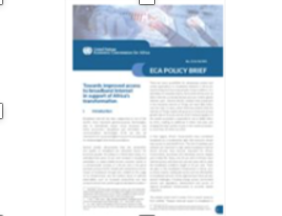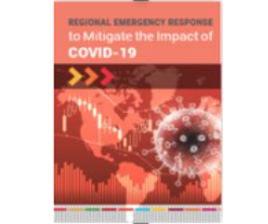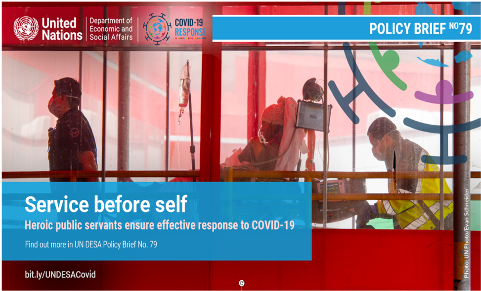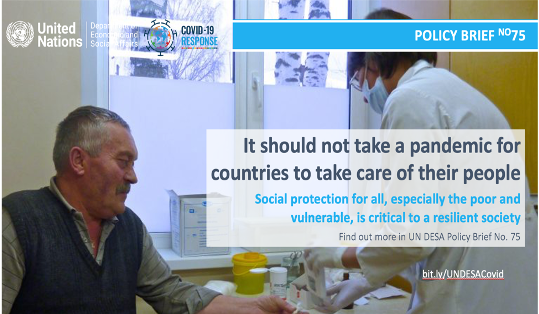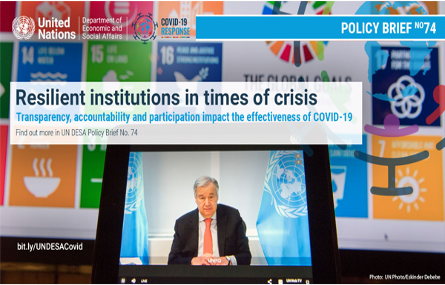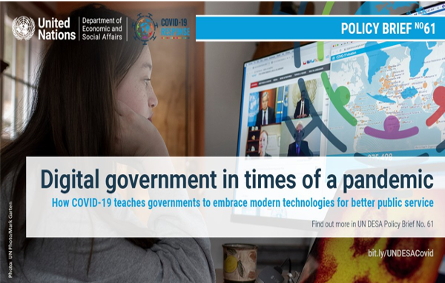Resources
Displaying 1 - 12 of 12
UN/DESA Policy Brief #123: Sandboxing and Experimenting Digital Technologies for Sustainable Development
| English | Digital Government | Global | Policy Brief | UN DESA/DPIDG
From innovation hubs and policy experiments to regulatory sandboxes
Digital technologies carry a promise to fast track sustainable development by supporting innovative, forwarding-looking policies and digital government solutions. There are, however, numerous risks and complexities of frontier technologies that come along with those opportunities, as well as policy and regulatory challenges such as those related to inclusion, competition,…
UN/DESA Policy Brief #117: Building the Capacities of Public Servants to Implement the 2030 Agenda
| English | Governance and Public Institutions | Global | Policy Brief | UN DESA/DPIDG
The 2030 Agenda recognizes that capacity in governments at all levels is critical to steer and support the transformations which it calls for. Thus, public servants at all levels of government need the capacity to successfully implement, follow up and review the Sustainable Development Goals (SDGs).
The SDGs are an umbrella framework encompassing almost every sector of human activity. In a broad sense, “capacity for implementing the SDGs”…
UN/DESA Policy Brief #116: A view of Changes in Institutional Arrangements for SDG Implementation at the National Level Since 2015
| English | Governance and Public Institutions | Global | Policy Brief | UN DESA/DPIDG
Five years after the adoption of the 2030 Agenda for Sustainable Development, with one third of the implementation period of its 17 Sustainable Development Goals having elapsed, it is important to take stock of relevant institutional arrangements at the national level. Institutionalization of the 2030 Agenda and the SDGs lays the foundation for their effective implementation. It also serves as an indicator of the degree to which the Agenda is…
UN/DESA Policy Brief #114: Connecting the Dots: The Still Elusive Synergies Between Accountability Institutions and the Follow-up and Review of the Sustainable Development Goals
| English | Governance and Public Institutions | Global | Policy Brief | UN DESA/DPIDG
The 2030 Agenda highlights the importance of the follow-up and review of the Sustainable Development Goals (SDGs) as an accountability mechanism and sets clear principles to guide it. Accountability institutions such as parliaments and supreme audit institutions (SAIs) are playing an increasing role in SDG oversight and assessment. However, while countries have made significant progress in institutionalizing SDG follow-up and review, the…
Dubai Policy Review 2
| English | Governance and Public Institutions | Middle East | Policy Brief | ESCWA
Can smart cities help us achieve true sustainable development? With merely a decade to go to deliver on the 2030 agenda and the universal Sustainable Development Goals (SDGs), digital development is seen as a forceful catalyst that can help governments close developmental gaps and accelerate progress. In particular, smart and sustainable cities are becoming microcosms of policy and governance transformation challenges we face in our drive…
Integrating Transparency, Accountability and Anti-Corruption in Socio-Economic Impact Analyses
| English | Digital Government | Africa | Policy Brief | ECA
The COVID-19 pandemic has brought chaos, uncertainty and supply chain disruptions to the global economy, impacted lives and livelihoods, and tested the resilience of governance systems, institutions and mechanisms in responding to the crisis. As the technical lead for the socio-economic response to the COVID-19 pandemic in the UN system, UNDP and its Country Offices worldwide are working to assess the socio-economic impacts of the COVID-19…
Towards Improved Access to Broadband Internet in Support of Africa’s Transformation
| English | Digital Government | Africa | Policy Brief | ECA
North African economies are characterized by slow economic diversification and persistent unemployment, especially among educated youth. Labour productivity has registered only a moderate increase compared with more dynamic emerging countries like India or Turkey. These patterns share a common origin, which lies in the existence of many distortions in the economy that prevent an efficient allocation of resources between firms and sectors. These…
Socioeconomic Impact of COVID-19: Policy Briefs
| English | Innovation and Service Delivery | Middle East | Policy Brief | ESCWA
A decade marked for accelerated action and delivery towards sustainable development has been disrupted by a global health threat that has severely impacted the Arab region. The focus now is on urgent action to save lives and repair livelihoods. This crisis is a stark reminder of why an efficient and effective public sector is the first line of defence in addressing systemic risks. This perilous pandemic is spreading through the Arab region at a…
The Role of Public Service and Public Servants during the COVID-19 Pandemic
| English | Innovation and Service Delivery | Global | Policy Brief | UN DESA/DPIDG
Key messages:
1. Comprehensive public service capacity development: Governments must pay attention to developing the capacities of the public service and public servants; be it in their numbers, their competences, values, the protective gear they need, the incentives for their productivity, the tools and facilities as well as the technology they require to effectively do their jobs. Governments must invest in having very well-functioning…
COVID-19: Reaffirming State-People Governance Relationships
| English | Governance and Public Institutions | Global | Policy Brief | UN DESA/DPIDG
The emergence and spread of the coronavirus in late 2019 and the impact of its disease, COVID-19, which has been categorized by the World Health Organization as a global pandemic, is, at the time of writing, ongoing.
Efforts by governments to try to control the pandemic’s spread while managing its wide-ranging impacts demonstrate the critical role of the relationship between state and people in shaping and determining government responses,…
Resilient Institutions in Times of Crisis: Transparency, Accountability and Participation at the National Level Key to Effective Response to COVID-19
| English | Participation and Accountability | Global | Policy Brief | UN DESA/DPIDG
National institutions are strongly impacted by the coronavirus (COVID-19). The pandemic has disrupted to varying extents the regular functioning of state institutions, such as parliaments and justice systems, and affected key government functions and processes, undermining the effectiveness of government action. The need to respond quickly and with drastic measures has also created additional risks for institutional processes and organisations.…
COVID-19: Embracing Digital Government During the Pandemic and Beyond
| English | Digital Government | Global | Policy Brief | UN DESA/DPIDG
The COVID-19 pandemic is forcing governments and societies to turn toward digital technologies to respond to the crisis in the short-term, resolve socio-economic repercussions in the mid-term and reinvent existing policies and tools in the long-term. Navigating through these challenging times requires governments to adopt an open government approach and to use digital communication channels to provide reliable information on global and national…
 Bienvenidos a las Naciones Unidas
Bienvenidos a las Naciones Unidas


